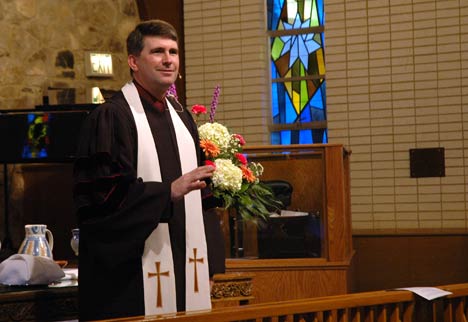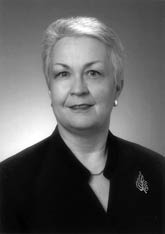
The Rev. Ken Diehm preaches at First United Methodist Church in Grapevine, Texas. The Study of Ministry Commission has released its final report that includes eight recommendations on the ordering of ministry in The United Methodist Church.
A UMNS file photo by John Gordon.
After more than two years of study, a commission has issued its final report on its work to clarify the ordering of ministry within The United Methodist Church and recommends four more years of study by the church.
The Study of Ministry Commission report lays the groundwork for the church to reflect further on the theological, ecclesial and practical groundings of its system of lay, licensed and ordained ministry.
"We have proposed a new vision for the ordering of set-apart ministry," said the Rev. Mary Ann Moman, a commission member and associate general secretary of the Division of Ordained Ministry within the United Methodist Board of Higher Education and Ministry.
"We have spelled this out in the report, but we believe conversations are needed throughout the church to anticipate some of the consequences of following the road map we have set out."
Created by the 2004 General Conference, the 28-member commission sought to address ambiguity in the denomination's understanding of lay, licensed and ordained ministry. The panel is to bring its recommendations to the 2008 General Conference, the denomination's top legislative body, which convenes next April in Fort Worth, Texas.
The commission has submitted a resolution to the upcoming General Conference asking that its report be referred to the church for ongoing study and conversation through the 2009-2012 quadrennium "for the purpose of clarifying the vision and building consensus." The resolution also calls for the commission to develop comprehensive legislation based on those conversations for consideration by the 2012 General Conference.
Eight recommendations
The 49-page report makes eight recommendations about the ordering of ministry, including separation of ordination from full conference membership. The final report is available at www.gbhem.org.
The commission also recommends doing away with the practice of commissioning which it describes as "poorly developed intermediate steps" and simply ordaining deacons and elders when candidates have met basic requirements. In addition, the commission calls for all current associate members to be eligible for ordination as elder and conference membership in full connection. The category of associate member would be discontinued.
".... We believe conversations are needed throughout the church to anticipate some of the consequences of following the road map we have set out."
— The Rev. Mary Ann Moman
Because nearly one-third of all pastors are presiding over the sacraments of baptism and Holy Communion without ordination, the commission proposes expanding the range of those who qualify for ordination as elder.
Even with this expansion, the commission recognizes there may be times when circumstances demand "extraordinary ministry" a term borrowed from Methodism founder John Wesley. Thus, the commission proposes that bishops may grant local sacramental authority in the place of appointments to those who are not ordained elder, but are approved by the Board of Ordained Ministry and appointed by the bishop.
The commission has not approved any changes in voting rights or General Conference representation of local pastors. "We believe the church should wrestle with the possibilities of the proposed road map before making such changes," the report says.
A complex task

The Rev. Mary Ann Moman
Moman said the commission task was too complex to complete in four years. "The sheer number, qualifications and procedures related to the already existing offices of ministry in The United Methodist Church is one factor in believing the church needs more time to look at this issue before General Conference takes action," she said.
Another factor is the complexity of issues related to the theology of the church.
"... The theological foundations and the consequent practices of ministry within The United Methodist Church reflect fundamental differences in the ecclesiologies of our predecessor denominations that are Anglican, Catholic, Reformed, Pietist and Evangelical in heritage, and these differences have not been adequately addressed through the process of merger and union," the resolution states in its case for further study.
The commission plans to develop a study guide for use in local churches to further churchwide discussion, Moman said.
*Brown is an associate editor and writer in the Office of Interpretation, United Methodist General Board of Higher Education and Ministry.
News media contact: Tim Tanton, Nashville, Tenn., (615) 742-5470 or [email protected].
Related Articles
Commission wants further study of church's ministry
The study of ministry: Where are we headed?
Ministry commission hears survey results on report
Resources
Like what you're reading? Support the ministry of UM News! Your support ensures the latest denominational news, dynamic stories and informative articles will continue to connect our global community. Make a tax-deductible donation at ResourceUMC.org/GiveUMCom.



